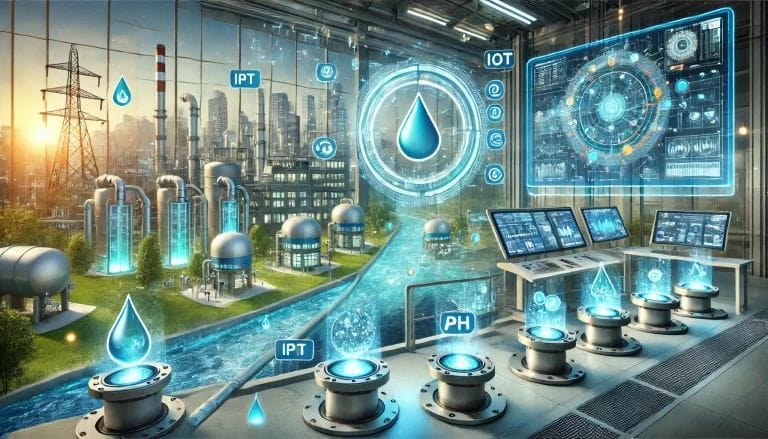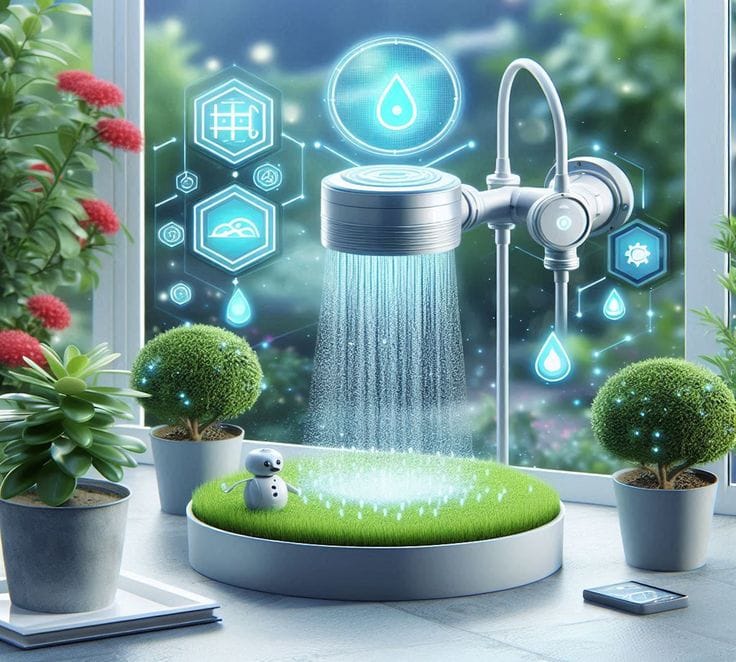In an era where water scarcity issues and increasing demand are pressing concerns, smart water management systems are reshaping how we manage, conserve, and monitor our water resources. By integrating smart technology, IoT-enabled tools, and advanced data analytics, these systems offer more than just automation. They offer sustainable and intelligent control over water infrastructure, from water distribution networks to wastewater management systems. This article explores the various dimensions of smart water management, its components, technologies, and impact on public water systems and smart cities alike.
What Is Smart Water Management?
Smart water management refers to the use of smart devices, IoT technologies, and data-driven analytics to enhance the efficiency of water systems. These modern systems replace traditional water management systems by allowing real-time monitoring, predictive maintenance, and adaptive water treatment strategies. The goal is to ensure quality of drinking water, reduce water loss, and improve the performance of water distribution and supply management.
Key Components of Smart Water Management
The components of smart water management include smart water meters, sensors and IoT devices, smart irrigation systems, real-time analytics software, and intelligent water management practices. These tools work together to monitor water levels, detect leaks, optimize water use, and provide valuable insights into the quantity of water used across sectors.
The Role of Intelligent Water Systems
Intelligent water systems are revolutionizing how cities and industries address water and sanitation challenges. Through smart water monitoring and management, these systems offer continuous updates about water consumption, detect anomalies in water flow, and help water utility operators make data-driven decisions to manage our water resources more efficiently.
Benefits of Smart Water Management Systems
The benefits of smart water solutions are profound. They improve water efficiency, reduce water waste, ensure consistent drinking water quality, and lower operational costs. As a result, the advantages of smart water management extend to both environmental sustainability and financial performance.
How IoT Enhances Water Monitoring
IoT is the backbone of modern water monitoring. With IoT devices integrated into pipelines and pumps, utilities can track water levels, pressure, and water quality in real time. This improves the efficiency of water systems and enables prompt action when issues arise.
💡 Did You Know? Smart water sensors can detect leaks in underground pipes within minutes, preventing major losses.
Smart Water Monitoring Technologies
Water monitoring and management systems leverage real-time sensors, data platforms, and cloud analytics to deliver precise water treatment plan accordingly. These tools enable accurate forecasts and streamline smart water management technology for efficient water supply systems.
Real-Time Water Quality Monitoring
Modern technology allows cities to conduct continuous monitoring the water quality to meet public health standards. These systems monitor various types of water, ensuring that the quality of drinking water remains within safe levels.
Advanced Water Supply and Usage Tracking
Real-time water metering and smart meters offer utilities detailed insights into water usage patterns. This technology ensures more precise water distribution, which helps in identifying inefficiencies and making timely adjustments to water supply routes.
Addressing Water Scarcity and Conservation
With water on Earth being limited, tackling water scarcity for at least future generations demands urgent action. Smart water management solutions help conserve water by reducing leaks and promoting informed water conservation efforts.
Benefits of Smart Water Conservation Systems
The benefits of smart water management for conservation are numerous. They allow for more efficient irrigation, minimize reducing water losses, and promote responsible use of water resources—all key factors in global water conservation efforts.
💡 Did You Know? Smart irrigation systems can reduce water use in agriculture by up to 30%.
Implementing Smart Water in Urban Areas
Implementing smart water strategies in urban regions means integrating advanced smart technology within existing water infrastructure. This supports smart cities development and aligns with sustainable urban planning goals.
Optimizing Water Infrastructure with Smart Systems
To modernize the distribution of water, municipalities must upgrade water infrastructure with smart water systems. These upgrades ensure more accurate control over the water distribution network and reduce inefficiencies.
Smart Water Treatment Plant Management
A water treatment plant using smart water management systems can adjust operations based on real-time data, improving treatment outcomes while lowering energy consumption. This enhances both water quality and system resilience.
Integrating IoT into Water Infrastructure
IoT integration improves the management of water resources by enabling predictive maintenance, reducing downtime, and enhancing water utility operations. These technologies are key to building a responsive water network.
💡 Did You Know? The global smart water market is expected to grow by over 10% annually due to the rising demand for innovative solutions in the water sector.
Challenges in Water Management Systems

Despite the advantages of smart water management, many water utilities still struggle with legacy issues. High initial investment costs, regulatory uncertainty, and fragmented water infrastructure are among the most pressing challenges. Integrating smart meters and smart water devices into older, rigid frameworks requires not only time but also specialized resources. Additionally, the performance of water systems under smart control depends on accurate, continuous monitoring the water quality, which may be unavailable in underfunded areas. The types of water usage. From agricultural to industrial. Also introduce complexity in creating unified water management systems.
Barriers to Implementing Smart Water Solutions
Implementation barriers vary across regions but typically include a lack of water sector funding, limited access to smart technology, and resistance to systemic change from traditional operators. Many local governments lack awareness about the applications of smart water management and their long-term value. Moreover, workforce shortages. Particularly in iot technologies and data analytics. Create a skill gap. Without consistent training, it’s difficult to manage water effectively using new systems. These challenges delay progress in using smart water management solutions to modernize public water services and reduce water waste.
Maintenance and Data Security in Smart Water Systems
Incorporating iot devices and smart devices into water monitoring and management systems raises legitimate concerns about cybersecurity. Real-time data on water levels, water flow, and water consumption must be protected from unauthorized access, manipulation, or system shutdowns. Therefore, water utility operators must invest in secure infrastructure that ensures the quality of drinking water and operational integrity. Regular system maintenance, software updates, and ethical data use are crucial. These concerns echo those found in other sectors using smart systems. Where uptime and accuracy are mission-critical for public trust and safety.
Future of Smart Water Management

The future of water lies in intelligent, resilient, and automated systems that can adapt to climate change, growing populations, and increasing water scarcity issues. Smart water management systems will become more predictive through AI, capable of reducing water loss, and fully integrated with smart cities. Expect increased use of real-time water metering, autonomous leak detection, and efficient water supply systems that optimize based on demand. As innovation progresses, we’ll also see expanded roles for smart irrigation systems, enabling farmers to conserve water while boosting crop yields. These advances show how smart water management technology is truly transforming water management globally.
Innovations in Water Treatment and Monitoring
Recent innovations are reshaping water and wastewater management through AI, robotics, and drone technologies. Smart water monitoring and management tools can detect contamination sources, forecast trends, and adapt water treatment plan accordingly. For instance, real-time imaging combined with machine learning helps predict outbreaks or pollution near drinking water sources. Enhanced water metering and other applications now offer more control over water usage, helping governments and industries make smarter, data-driven decisions. These technologies not only improve water quality but also empower communities to better use of water resources sustainably.
Global Trends in Smart Water Technologies
Across the globe, there’s a growing move toward digitalizing water distribution networks. Countries facing water scarcity for at least part of the year. Like India and South Africa. Are early adopters of smart water management systems. The focus is on improving efficiency, accountability, and environmental resilience. International collaborations are promoting knowledge-sharing around smart water meters, sensors and IoT, and AI-based analytics. The distribution of water is becoming more precise, especially in regions where the quantity of water is severely limited. These innovative solutions are now being piloted by NGOs, municipal bodies, and even oral health professionals who emphasize the link between hygiene and water and sanitation.
Frequently Asked Questions about Smart Water Management
How does smart water management work?
Smart water management is the strategic use of sensors, data analytics, and IoT devices to monitor, predict, and control water systems in real time. It aims to ensure efficient use of water resources, reduce water waste, and improve overall sustainability. Much like how oral health professionals offer instructions for good hygiene, smart systems give precise guidance for water utility operators to optimize supply and consumption.
What is smart water management?
It works by integrating smart sensors, IoT platforms, and cloud-based data analytics to collect and interpret water flow and usage. This process happens automatically and can adjust water supply or detect leaks in real time, operating far more efficiently than traditional water management systems. Just as you would floss between two teeth to maintain cleanliness, smart systems detect the smallest irregularities away from the teeth of manual errors.
What is the smart water controversy?
Because smart water solutions reduce water loss, enhance healthy teeth and gums-like resilience in infrastructure, and help manage our water resources during crises like droughts. They are designed to meet the care needs of growing cities and promote sustainability through smart water technology. It’s similar to following health tips to preserve your wellbeing. Only here, the wellbeing of our planet is at stake.
why smart water?
The main controversy centers around cost, data privacy, and digital access. Critics argue that while smart water systems promise efficiency, they may widen the gap in service for poorer communities. Much like the burden of oral diseases disproportionately affects those without care, lack of access to smart infrastructure can lead to unequal distribution of water and sanitation services.
who started smart water?
Smart water technology began with tech leaders like IBM and GE, but true momentum came from engineers and oral hygienists within the water sector. They advocated for better water management practices using smart tools to improve their water systems just as dentists strive to enhance oral hygiene through early detection and continuous care.
The rise of smart water management systems marks a transformative era in global water management practices. By combining smart technology, IoT, and data analytics, we are not only improving how we manage water, but also shaping a more sustainable future. Whether through smart meters, intelligent water treatment solutions, or real-time monitoring, the path forward is clear: transforming water management is not a choice. It’s a necessity. What step will your city take next to join the smart water revolution?
Read also about Smart Building Management